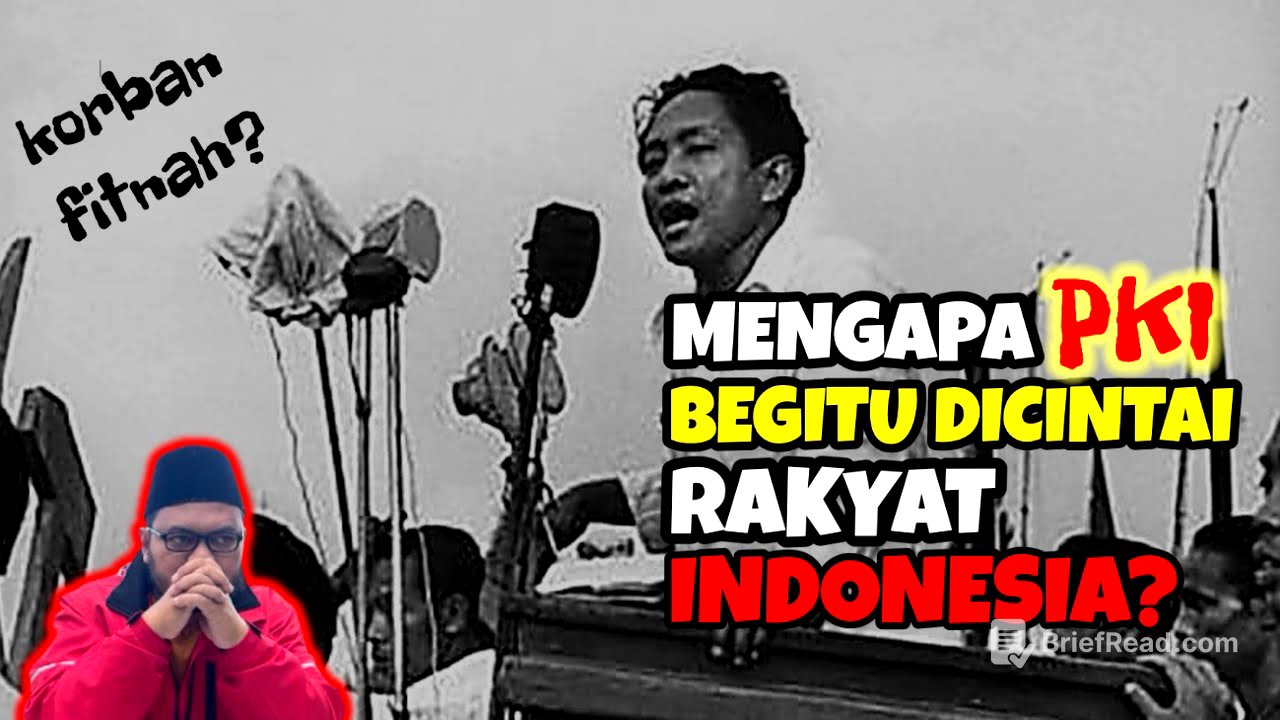TLDR;
The video discusses how the Indonesian Communist Party (PKI), despite being widely hated in 1948 after a failed rebellion, managed to become one of the top four political parties in Indonesia by 1955. It explores the strategies used by the PKI to gain popularity by exploiting the characteristics of Indonesian society, such as forgetfulness, a tendency to claim poverty, emotional impulsiveness, and deference to large groups. The video also warns that these strategies are still relevant and can be used by political parties and agitators today.
- PKI exploited Indonesian's societal characteristics to gain popularity.
- The strategies included exploiting forgetfulness, poverty claims, emotional impulsiveness, and deference to large groups.
- These strategies are still relevant today.
The PKI's 1948 Rebellion and Subsequent Fall From Grace [0:03]
In 1948, Amir Syarifuddin invited Muso back to Indonesia to lead a rebellion under the PKI banner, aiming to overthrow Soekarno Hatta's government. This was driven by Amir Syarifuddin's disappointment at losing his Prime Minister position. The rebellion was thwarted by the Indonesian National Army (TNI), leading to a period where the PKI was heavily criticized by both the government and the people. This was due to three major mistakes: Amir Syarifuddin signing the Renville Agreement, which legitimized Dutch aggression and reduced Indonesian territory, his subsequent rebellion after being dismissed for signing the agreement, and the rebellion itself, which showed a lack of nationalism and solidarity during a critical time for Indonesia's independence.
The PKI's Resurgence: From Hated to Favored [2:14]
Despite being widely hated in 1948, the PKI remarkably re-emerged in the political landscape, securing a spot among the top four parties in the subsequent election, capturing 15% of the votes. This resurgence raises the question of how a party once so despised managed to regain popularity and become a favorite among the Indonesian people. The video aims to explain the strategies and scenarios employed by the PKI to win votes, emphasizing the importance of understanding these tactics as they could potentially be used to incite future revolutions or win elections.
Exploiting Indonesian Characteristics: The PKI's Strategy [3:30]
To regain popular support after being heavily criticized, the PKI employed a strategy based on understanding and exploiting four key characteristics of Indonesian society. First, Indonesians tend to be forgetful, which the PKI used to their advantage. Second, Indonesians are often suspicious of the wealthy and frequently portray themselves as poor. Third, Indonesians are emotional, impulsive, and easily incited, making them susceptible to being pitted against each other. Finally, Indonesians tend to respect and align with large groups, avoiding criticism or opposition.
Strategy 1: Capitalizing on Forgetfulness [5:12]
The PKI capitalized on the Indonesian tendency to forget by presenting themselves as a new, different entity from the PKI of 1948. They emphasized that the party was now led by progressive figures like Aidit, Nyoto, and Lukman, who were in their early thirties at the time. They claimed to have abandoned revolutionary and internationalist approaches in favor of a constitutional path, focusing on supporting the common people. The video argues that this strategy worked because Indonesians tend to forget past events, as evidenced by the continued support for political parties with corrupt members and the willingness to engage in divisive politics during elections.
Strategy 2: Exploiting Perceptions of Poverty [8:45]
The PKI exploited the perception of poverty among Indonesians by portraying themselves as the party of the "wong cilik" (common people), the marginalized, and the oppressed. Their slogans from 1948 to 1965 focused on exploiting poverty and disappointment. The PKI often infiltrated protests and amplified hatred towards the government, turning disappointment into a call for revolution. They identified neocolonialism, neoimperialism, foreign influence, bureaucrats, and feudalism as the causes of poverty, and targeted "seven village devils," leading to the seizure of land from religious leaders (kiai).
Strategy 3: Manipulating Emotional Impulsiveness [12:34]
The PKI exploited the emotional and impulsive nature of Indonesians by easily instigating conflict within society. For example, they would take land from religious leaders, distribute it to the people, and then step back, allowing the resulting conflict between the religious leaders' supporters and the new landowners to unfold. The PKI would then frame themselves as heroes, gaining public support. They also exposed corrupt bureaucrats, inciting public anger and taking control of local government.
Strategy 4: Leveraging the Power of Large Groups [14:15]
The PKI leveraged the tendency of Indonesians to align with large groups by creating numerous affiliated organizations (underbow) in various professions. These included the Indonesian Farmers Association (BTI), the Central Organization of Indonesian Workers (SOBSI), the Institute of People's Culture (LEKRA), People's Youth, Gerwani (women's movement), and HSI (various others). By creating these large, dominant groups, the PKI was able to isolate and marginalize those outside their network, further solidifying their power and influence.
The PKI's Legacy and Contemporary Relevance [17:22]
The video concludes by emphasizing that the PKI's strategies of exploiting the weaknesses in Indonesian society are still relevant today. These tactics can be used by political parties and agitators to create unrest and division. The video warns against the exploitation of the four characteristics of Indonesian society: forgetfulness, a tendency to claim poverty, emotional impulsiveness, and deference to large groups.









